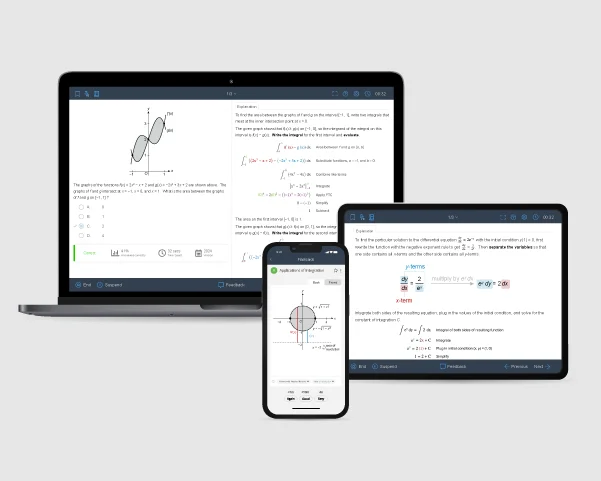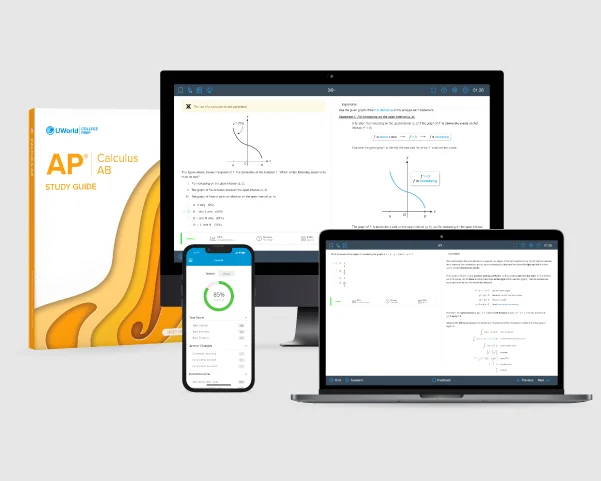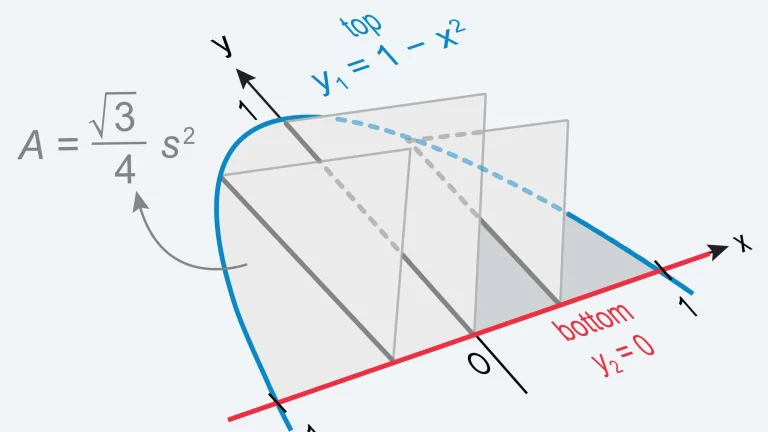Calculus AB is one of the most popular AP exams students take every year, and rightly so, as it is one of the core AP courses that grant you placement and credits in college. However, it is also one of the most challenging AP exams. In this guide, we’ll look at all the AP Calculus AB exam information, starting from prerequisites to course concepts, to help you decide whether this is the right course for you.
AP Calculus AB: Equivalent Course and Eligibility
AP Calculus AB is an introductory college-level math course designed to be the equivalent to a first-semester college calculus course. The AP Calc AB exam covers fundamental topics in calculus such as limits and continuity, differentiation, integration, accumulation of change, and differential equations.
Since the course content aligns with an introductory college-level math syllabus, it can feel overwhelming for those who don’t have a knack for tackling complex mathematical problems. In particular, becoming familiar with the properties and composition of functions is crucial for building a foundation to understand concepts like differential and integral calculus.
As challenging as it can be, AP Calculus AB could be the right fit if you have an aptitude for mastering complex mathematical formulas and concepts! Most AP instructors recommend having a strong foundation in precalculus, algebra, geometry, and trigonometry during high school. A solid grasp of these subjects will make preparing for the AP Calc AB exam significantly easier. You can boost your preparation with our AP Calc AB Prep Course designed to guide you through every step of the learning process.
What Is on the AP Calculus AB Exam?
Knowing what to expect on the AP Calculus AB exam is crucial to ace it. The exam assesses your understanding of Differential and Integral Calculus, including parametric, polar, vector functions, and series. It also covers linear, polynomial, rational, exponential, logarithmic, trigonometric, inverse trigonometric, and piecewise-defined functions. You’ll be required to solve problems using these concepts and formulas while clearly explaining your reasoning with correct notations.
Familiarizing yourself with exam-level questions from our AP Calculus AB Course can help improve your performance and confidence.
The test broadly evaluates your knowledge of three key concepts or ‘big ideas’ covered in the course:
- Change (CHA)
- Limits (LIM)
- Analysis of Functions (FUN)
These “big ideas” are distributed across 8 units to help students understand each concept efficiently. The course content is frequently found in many college courses. Let’s take a look at what these 8 units are and their relative weighting in the AP Calculus AB exam:
| Units | Unit Name | Exam Weight |
|---|---|---|
| Unit 1 | Limits and Continuity | 10–12% |
| Unit 2 | Differentiation: Definition and Fundamental Properties | 10–12% |
| Unit 3 | Differentiation: Composite, Implicit, and Inverse Functions | 9–13% |
| Unit 4 | Contextual Applications of Differentiation | 10–15% |
| Unit 5 | Analytical Applications of Differentiation | 15–18% |
| Unit 6 | Integration and Accumulation of Change | 17–20% |
| Unit 7 | Differential Equations | 6–12% |
| Unit 8 | Applications of Integration | 10–15% |
If you’re curious to learn more about these units and the big ideas, check out our AP Calculus AB Course and Exam Description page! The 8 course units listed above equip you with specific mathematical practices that will prepare you to ace the AP Calc AB exam. Let’s take a look at what these practices are:
- Implementing Mathematical Processes
- Connecting Representations
- Justification
- Communication and Notation
It is important to note that all the questions on the exam will revolve around these four practices, which you will master by the end of your AP Calculus AB course. As you progress through the units and learn each concept, remember to go back and reflect on the big ideas that each unit encompasses. Understanding the fundamentals of a subject is the core of a solid learning process.
2025 AP Calculus AB Exam Format
The AP Calculus AB question booklet consists of 2 sections: multiple-choice (MCQs) and free-response (FRQs). The exam lasts for 3 hours and 15 minutes, during which you’ll have to answer 45 MCQs in Section I and six FRQs in Section II. Each section is divided into parts A and B, which classify the questions based on whether a calculator is permitted. Let's take a look at the exam format for Calculus AB:
Section I: Multiple-Choice Questions (MCQs)
Time: 1 hour and 45 mins - 45 questions | 54 points - Weight: 50% of the composite score
The first part of your AP Calc AB exam will consist of MCQs where you must select the correct answer from the 5 choices for each question. This section is divided into 2 parts:
| No. of Questions | Time | Calculator Usage | |
|---|---|---|---|
| Part A | 30 MCQs | 60 minutes | Calculator NOT permitted |
| Part B | 15 MCQs | 45 minutes | Graphing calculator required |
Your MCQ responses are computer-graded, providing a raw score based on the number of correct answers. Remember, you won’t be penalized for a wrong answer. Your score is determined by the number of correct answers. So, if you’re unsure of a particular question, eliminate obviously incorrect options then take a guess.
Section II: Free-Response Questions (FRQs)
Time: 1 hour and 30 mins - 6 questions | 54 points - Weight: 50% of the composite score
The second part of your AP test will assess your analytical problem-solving skills. As the name suggests, the free-response section allows you to answer a problem in your own way. This section is divided into 2 parts:
| No. of Questions | Time | Calculator Usage | |
|---|---|---|---|
| Part A | 2 FRQs | 30 minutes | Graphing calculator required |
| Part B | 4 FRQs | 60 minutes | Graphing calculator NOT permitted |
If you want to learn more about the exam format and explore some sample questions, our guide on the AP Calculus AB exam format is here to help. Now, let’s dive into exam scoring.
How Is the AP Calculus AB Exam Scored?
The AP Calc AB exam is scored on a scale from 1 to 5, with 5 being the highest possible score. Scoring a 3 or higher on the exam can earn you an advanced placement and credit, depending on the AP Credit Policy of the colleges to which you’re applying.
The table below shows how your AP Calculus AB exam score equates to a college grade for introductory calculus or math:
| AP Exam Score | Equivalent College Grade |
|---|---|
| 5 | A+ or A |
| 4 | A- or B+ or B |
| 3 | B- or C+ or C |
| 2 | — |
| 1 | — |
Calculus AB is an important AP subject, but it’s usually better for students interested in science majors. If you’re more into business or social science, statistics might be a more beneficial math course to pursue. Wondering if Calculus AB is right for you? Let’s find out!
Why Should You Take AP Calculus AB?
Your high school teachers and AP instructors will tell you that AP Calculus AB is best suited for students who are strong in math and wish to secure a foundation in calculus for their college. While that’s true to an extent, you could opt for it even if you haven’t decided on your college major.
Let’s look at what AP Calculus AB offers you:

- Prepare for College: It provides exposure to college-level material and eases your transition to higher education.
- Boost Your College Applications: AP Calculus stands out to admission officers, showcasing your willingness to take on tough subjects.
- Earn College Credits: A score of 3+ can earn you college credits, saving time and tuition fees.
- Strengthen Your Transcript: AP courses are often weighted more heavily in GPA calculations, helping to improve your academic profile.
- Save Time and Money: With AP credits, you may skip introductory math courses, reducing overall college costs.
- Introduce Yourself to Calculus: Learning calculus opens doors to other fields like Physics and Engineering, building essential skills for college and career success.
Should You Take AP Calculus AB?
To help you decide if AP Calculus AB is a good fit for your strengths, you could start with a few questions. Ask yourself:
- Have studied precalculus in high school? Precalculus is recommended before taking AP Calculus AB.
- Do you love studying precalculus and math? AP Calculus AB is challenging and requires full commitment.
- Is math a part of your future goals? It's ideal for students pursuing math, science, or engineering-related fields.
- Is math one of your academic strengths in high school? Success in AP Calculus AB is more likely if you're already good at precalculus and math.
Additionally, ask your teachers and seniors for past-year course curricula to help you decide whether Calc AB aligns with your abilities.
Is AP Calculus AB Hard?
AP Calculus AB can be challenging, with only 64.4% of test-takers scoring a 3 or higher in 2024. It requires a strong grasp of integral and differential calculus, which many students find tough. Supplementing your AP classes with self-study or online resources can greatly improve your chances of success.
Factors that influence difficulty:
- Prior Math Success: Strong performance in precalculus increases your chances of succeeding.
- Memorization & Analytical Skills: Success in AP Calculus AB requires both memorization of formulas and the ability to apply them analytically.
- Preparation: Reviewing course materials in advance and seeking advice from teachers or peers can help you understand the workload and challenges ahead.
- Time Management: Effective study schedules and time management are key to balancing this demanding course with your other responsibilities.
While challenging, with the right preparation and determination, you can succeed. If you're looking for a tougher challenge, you could consider the AP Calculus BC exam, which includes additional units.
Should I Take AP Calculus AB or BC?
AP Calculus BC covers everything in AB plus additional units. If you’re planning to major in math, engineering, or similar fields and want to earn credit for a full year of college calculus, BC might be the better choice. However, AP Calculus AB is still a great option, offering credit for one semester of college calculus while covering less content than BC. Both courses can help you prepare for math-focused careers and earn valuable college credits.
You can read more about the difference between AP Calculus AB and BC to help you choose your subject based on your career plan and interests.
Is AP Calculus AB or BC Harder?
AP Calculus BC could be harder due to the extra units and faster pace. If you're unsure, consider your career goals and math aptitude to make the right choice.
| Questions to Ask Yourself | Calculus AB or BC |
|---|---|
| Are you taking precalculus? | AB and BC |
| Do you need a more flexible study schedule? | AB |
| Do you excel in math? | AB and BC |
| Are you worried about taking on a fast-paced course? | AB |
| Is your high school course-load already heavy? | AB |
| Do you think you can cover more material and complete longer assignments? | BC |
| Want to stand out for college admissions, even if your planned major doesn’t involve much math? | AB |
| Are your future career goals math-heavy? | AB and BC |
Although there is no explicit information on whether AP Calculus AB is a prerequisite for Calculus BC, the College Board® states that:
“Because both courses and exams cover many of the same topics, the prerequisites needed for both courses and exams are comparable. Recommended mathematics courses to take before either AP Calculus AB or AP Calculus BC include those in which you study algebra, geometry, trigonometry, analytic geometry, and elementary functions.”
Since both exams are scheduled during the same time slot, students cannot take both the tests in the same academic year. Students also receive an AP Calc AB subscore as part of their Calc BC exam results, which indicates that AP Calc AB is not typically a prerequisite for taking Calc BC.
Precalculus vs. AP Calculus AB?
Precalculus lays the foundation for calculus, covering a broad range of concepts, including algebra, functions, and trigonometry. Key ideas like limits and series directly relate to calculus, while other topics help develop problem-solving skills for calculus problems. Precalculus is more general, while calculus focuses on understanding change—differential calculus examines change at an instant, while integral calculus looks at change over time.
Can I Take AP Calculus AB Without Precalculus?
While it’s recommended to take precalculus first, you can still succeed in AP Calculus AB without it if you have a strong background in math. Many precalculus concepts, like limits and function manipulation, will be revisited during the AP course, helping fill in any gaps.
What Are the Key Precalculus Topics for AP Calculus AB?
Important precalculus topics for AP Calculus AB include:
- Limits (often introduced in precalculus)
- Function manipulation, especially trigonometric, exponential, and logarithmic rules and identities.
These are foundational for tackling calculus concepts effectively.
Calculator Policy for AP Calculus AB
You can use a calculator during the AP Calculus AB exam, but it must meet College Board’s approved specifications. Make sure to check the approved calculator list ahead of time. Your proctor will verify your calculator’s model number. While you're not required to clear your calculator’s memory before or after the exam, you cannot store test materials in it. You can find a detailed list of approved calculators on our AP Exam Policies & Accommodations page.
Will we be required to clear our calculators before taking the AP Calculus AB exam?
The College Board doesn’t require you to clear your calculator’s memory before or after the exam. However, you cannot use calculator memories to carry test materials from the exam room.
Which calculator is suitable for the AP Calculus AB exam?
There are many graphic calculators from Casio, Sharp, Texas Instruments, and other brands that are approved by the College Board for the AP Calc AB exam.
AP Calculus AB Review Tips
Preparing for AP Calculus AB can be challenging but rewarding at the same time. Here are a few tips to help you along the way:
- Create a study schedule: Breaking your learning sessions into manageable chunks is essential for success. Our digital study planner makes it easy to organize your time so you can focus on watching video lessons, reading key concepts, and practicing effectively.
- Use a structured course for review: Our AP Calculus AB course provides a clear, step-by-step approach to mastering even the most challenging topics.
- Take notes: Use flashcards or a digital notebook to jot down key concepts and insights from videos and readings, helping you reinforce your understanding.
- Practice with AP Calculus AB exam style questions: Create custom AP Calculus AB practice tests to boost your confidence and refine your problem-solving skills.
At UWorld, we know that success on the AP Calc AB exam requires a clear, step-by-step approach to mastering complex concepts and formulas. Our course follows the Watch, Read, Practice method, combining engaging videos, detailed study materials, and exam-like practice questions to help you build confidence and understanding. Dive into our course today and start preparing effectively for the AP Calc AB exam!

Frequently Asked Questions
How long is the AP Calculus AB exam?
How many questions are there on the AP Calculus AB exam?
When do students take the AP Calculus AB exam?
Where do you find past AP Calculus AB exam questions?
How much does the AP Calculus AB exam cost?
How many college credits can you get with a score of 3, 4, or 5 in the AP Calculus AB exam?
What happens if you fail the AP Calculus AB exam?
Is Calculus AB the same as Calculus I?
References
- AP Calculus AB. (n.d.). apcentral.collegeboard.org. Retrieved December 9, 2024, from https://apcentral.collegeboard.org/courses/ap-calculus-ab
- AP Calculus AB Course Overview. (2020). apcentral.collegeboard.org. Retrieved December 9, 2024, from https://apcentral.collegeboard.org/media/pdf/ap-calculus-ab-course-overview.pdf
- AP Calculus AB and BC Course and Exam Description. (2020). apcentral.collegeboard.org. Retrieved December 9, 2024, from https://apcentral.collegeboard.org/media/pdf/ap-calculus-ab-and-bc-course-and-exam-description.pdf
- AP Score Distributions. (2024). apstudents.collegeboard.org. Retrieved December 9, 2024, from https://apstudents.collegeboard.org/about-ap-scores/score-distributions
- Past AP Calculus AB Score Distributions. (2024). apcentral.collegeboard.org. Retrieved December 9, 2024, from https://apstudents.collegeboard.org/about-ap-scores/score-distributions/ap-calculus-ab
- 2025 AP Exam Fees. (n.d.). apstudents.collegeboard.org. Retrieved December 9, 2024, from https://apstudents.collegeboard.org/exam-policies-guidelines/exam-fees
- AP Exam Fees. (n.d.). apcentral.collegeboard.org. Retrieved December 9, 2024, from https://apcentral.collegeboard.org/exam-administration-ordering-scores/ordering-fees/exam-fees
- Stand out in colleges. (n.d.). Benefits of AP. apcentral.collegeboard.org. Retrieved December 9, 2024, from https://apcentral.collegeboard.org/about-ap/ap-a-glance/discover-benefits#footnote-2
Read More About AP Calculus AB Exam
AP Calculus AB Course and Exam Description (CED)
Want to learn about the AP Calculus AB Course and Description? Here’s a detailed overview on the topics covered during your Calculus AB course.
Have you ever wondered how your AP Calculus AB Exam is scored? This page has everything you need to know about the Calculus AB scoring system!
Prepping for your Calculus AB Exam? Help is just a click away with our detailed guide to the AP Calculus AB course content crafted by UWorld’s expert educators!
How to Self Study for AP Calculus AB
Self-studying for AP Calculus AB? Use this proven step-by-step guide to master concepts, stay organized, and achieve top exam scores.
Best AP Calculus AB Study Guide Comparison
Kaplan vs. Barron's vs. Princeton Review vs. UWorld—compare strategies, features, and effectiveness to find the ultimate guide for AP Calculus AB success.
Best AP Calculus AB Prep Course Comparison
Searching for top AP Calculus AB prep courses? Read this review to compare the best courses and choose the perfect one for your success.



